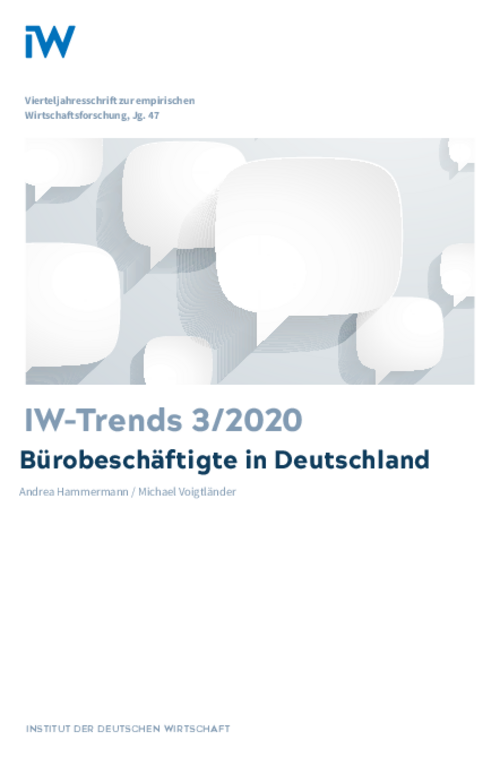With many regular surveys now discontinued or using outdated methodology, sound data on office- based employment in Germany are hard to come by. The present study aims to make a full national survey possible by developing an approach to measuring administrative employment based on analyses of the BIBB/BAuA Employment Survey, a telephone poll conducted every six years by the Federal Institute for Vocational Education and Training (BIBB) and the Federal Institute for Occupational Safety and Health (BAuA).

Office-based Employment in Germany: A Regional Analysis
IW-Trends

With many regular surveys now discontinued or using outdated methodology, sound data on office- based employment in Germany are hard to come by. The present study aims to make a full national survey possible by developing an approach to measuring administrative employment based on analyses of the BIBB/BAuA Employment Survey, a telephone poll conducted every six years by the Federal Institute for Vocational Education and Training (BIBB) and the Federal Institute for Occupational Safety and Health (BAuA).
By analysing occupations, it is possible to establish white-collar worker numbers, including the self-employed and civil servants, by sector. The approach also allows regional quantification of office-based employment. The results show that in Germany a total of around 14.8 million people work in offices. From 2012 to 2018, the number of office workers increased by almost 3 million, rising from 35.2 per cent to 36.7 per cent of the total workforce. Office-based employment has risen particularly sharply in Germany's seven largest cities, with increases ranging from 23 per cent in Düsseldorf to 42 per cent in Berlin, but even more steeply in certain less densely populated counties – especially in the southern state of Bavaria. Around 46 per cent of white-collar workers in regular employment work occasionally or frequently from home, and a further 39 per cent at least have the potential to do so. Since 2006, the proportion of employees doing remote work frequently or occasionally has risen by around 9 percentage points. In view of the structural changes that are currently taking place, and which may accelerate as a result of the corona pandemic, the German Economic Institute (IW) intends to publish regular empirical surveys of office-based employment in Germany.

Andrea Hammermann / Michael Voigtländer: Bürobeschäftigte in Deutschland – Eine Regionalanalyse
IW-Trends

More on the topic

What factors influence the career ambitions of people with disabilities?
Many companies in Germany report having difficulties not only in recruiting employees, but also in filling vacant management positions.
IW
Leadership in transformation: Megatrends and management as a driver of change
Leadership dynamics in companies are subject to constant change in order to meet the challenges of their time. Today, the greatest influences result from developments such as demographic change, globalization, individualization, structural change and ...
IW